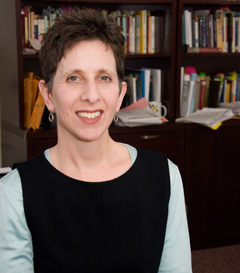Committed Modernist
It’s been a big year for Jessica Berman, chair of English: she was recently elected to the American Comparative Literature Association (ACLA) board, is putting the finishing touches on a book that she has been researching and writing for the past six years and is co-editing a new book series.
“The scholarship that I do bridges that distinction between a national literature department, like UMBC’s English department, and what we think of more properly as comparative literature,” she said. Berman’s work across these two fields allows her to bring a unique perspective to the classes she teaches. It is also getting her noticed in the scholarly community: Berman’s recent nomination and election to the board for the ACLA, the principal society in the United States for scholars whose work involves cross-cultural literary study, signals that she’s one of the premier voices in this field.
“It feels like a great accomplishment to have been able to continue work in this field and to have been recognized as a scholar at a national level,” she said.
Berman’s appointment to this board is an obvious choice based on her current scholarly work. Her recently completed book, tentatively titled “Modernist Commitments: Transnational Modernism between Ethics and Politics,” is at the cusp of a growing trend in the study of modernism because she looks at how authors influenced each other across national borders. This means that in addition to well-known modernist writers like James Joyce and Virginia Woolf, the book discusses writers from regions including the Caribbean, India and Spain. “In comparative literature you’re always thinking about how a text circulates,” she said. “When you come across somebody that nobody’s worked on or who people don’t really know exists, there’s a very exciting sense of discovery.”
The book also examines how these writers were influenced by and responding to each other and the political events of their times. “It’s really hard to shake this idea that if you are trying to complicate the picture of the world [as modernist writers do], it takes you away from concern with the world. I don’t think the two are mutually exclusive.”
Berman is helping to develop the field of transnational modernism in other ways, too; a new book series that Berman is co-editing called “Modernist Latitudes,” published by Columbia press, is seeking out and connecting scholars in this area of research. Berman and her co-editor, Paul Saint-Amour of the University of Pennsylvania, are selecting books for the series that consider modernism in new or understudied ways. When “Modernist Commitments” is published in late 2011 or early 2012 it will be the third book in the series.
With so many recent accomplishments, Berman isn’t slowing down. In fact, she’s already getting excited about what she expects to be her next book, a study of how modernist writers migrated not only between countries, but between media. As always, it’s a fresh approach to her field.
(2/21/11)

